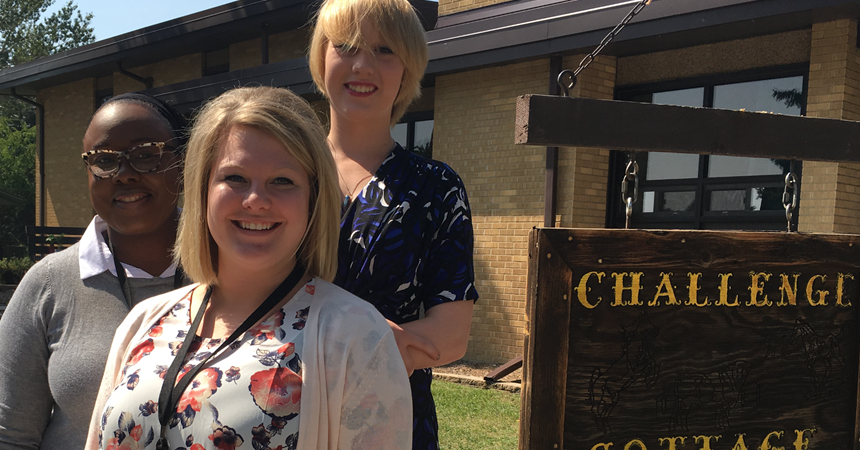As Vice President of Communications for the Ranch, part of my job is to bring the stories of Ranch children to the donors who support our work. I don’t work directly with the kids at the Ranch, but I see them every day. They look and sound like typical kids. As I see and hear them smile, talk, laugh, and listen to music on their iPods, it’s easy to forget the reality of what these kids have been through.
But then, occasionally, I have the incredible honor of having one of these children trust me with their story. Like D.J.
I first met D.J. at a staff and board picnic last summer in Minot. She was so poised as she gave several staff and board members (strangers to her) a tour of her home at the Ranch, Challenge Cottage. Her beauty, gentle spirit, and confidence shined through as she showed us every nook and cranny of the cottage, explained the house rules, and told us about the chores they had to do. She talked about what it was like to live with nine other teenage girls (a little chaotic!), about the friends she had made at the Ranch, and about her relationships with cottage staff.
I visited with D.J. again when she agreed to be interviewed for the Ranch Voice. She was open and brave as she shared her story. She wanted you to know about her and the Ranch. She was willing to share all the details, but out of respect for her and her privacy and her future, I have edited out some specifics. Just know that she has endured more than any 16-year-old should have to endure—in fact, more than most of us endure in a lifetime. This is D.J.’s story. I think you’ll find her as inspiring as I do. [Tammy Noteboom]
D.J. was raised by her father, who didn’t allow her to have any contact with her mother. She has never known her mom.
Right after her 16th birthday, D.J. experienced a horrifically traumatic event. She felt she had no place to turn for help, and started to find her own ways to cope with the pain that was always with her. D.J. started smoking marijuana and isolating herself—tuning out and pushing everyone away helped her feel safe.
“I was mean to my friends and didn’t want to be around anyone,” D.J. said. “I stopped going to work, and didn’t go out in public except to go to school.”
She was depressed, anxious, and angry… and felt alone.
Then her dad went to jail and she also had nowhere to live.
After spending a few days at the Youth Assessment Center, D.J.’s county social worker brought her to the Dakota Boys and Girls Ranch.
As you can imagine, she was nervous. She was already depressed and anxious—and now she was moving into a new home, going to a new school, and being pulled away from everything she had ever known.
But, D.J.’s strong inner character came through and she quickly adjusted to the stable living environment at the Ranch. “It’s a lot better here than what it used to be for me. You get three meals a day here, which is a plus. When I was living with my father, I was only eating once a day at school.”
D.J. talks about school and therapy, and all she has learned at the Ranch. Sometimes, she doesn’t give herself enough credit. Underneath the brokenness D.J. brought with her to the Ranch lies a deep wisdom. Ranch youth care workers, therapists, and spiritual life specialists just had to show her how to tap into the wisdom and strength that were already there.
“One of the most important things I’ve learned is to trust in myself,” D.J. said. “Before I came to the Ranch, someone told me that my life wasn’t worth living, and that I wasn’t worth being around because I had issues. Now I would say to that person, ‘I’ve heard worse things from better people. It doesn’t matter what you say about me. You can’t dictate who I am.’”
She also learned to treasure the little things in life. “Even the little things count,” D.J. said. “Treasure those little moments in life because one day something will go wrong in your life, and you’ll have those moments to hold onto and get you through it.”
Learning to trust others has been more difficult. “I’ve seen how Ranch staff have genuinely been there for me. They listen and say, ‘What can we do to make this better?’ I can now see myself trusting others. I’m not quite there, but I have a glimmer of hope. And hope can get you through a lot.”
While at the Ranch, D.J. also discovered how she can make a difference in other people’s lives. She plays drums as part of the music ministry during Ranch chapel services. And, she’s out in the community—a place she once shut out. “I volunteer at the nursing home. Ranch staff tell me I’ve touched a lot of lives at the nursing home, and a lot of lives there have touched me. [The residents of the nursing home] make me want to see the good in people.”
In mid-October, D.J. was preparing to move in with a foster family. She was excited for the home visit she had coming up, and sees it as an opportunity to start over.
But she won’t forget her time at this place of hope and healing. What does she want people to know about the Ranch? “The Ranch is someplace you can go when you don’t have anyone else to rely on.”
We take great care to guard the privacy of our children. Pictures and identifying information are only used with the permission of the children themselves and the written permission of their guardians.

